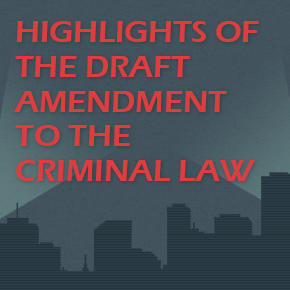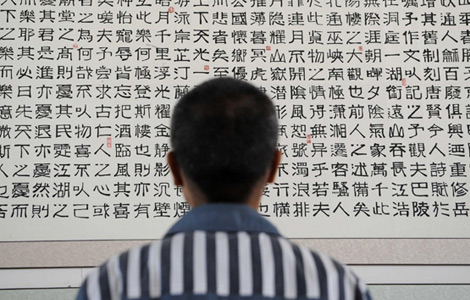Q & A on the Constitution
Q: Why does the Constitution have the highest legal effect?
A: First, the Constitution is the legislative basis of other laws. To illustrate, China has implemented a socialist market economy, which needs not only unified market principles but also a unified legal system. Similarly, the principles set by the Constitution are the foundation and basis of other laws.
Second, the Constitution has the highest legal effect of all laws. It bears the highest authority in the legal system. The content and spirit of other laws and administrative regulations may not contradict or violate the principles of the Constitution; if they did, they would be invalid.
Third, the Constitution is the fundamental guide for actions of all organizations and people.
Q: Why does the National Constitution Day fall on Dec 4?
A: The current Constitution is the version approved by the fifth Session of the fifth National People’s Congress (NPC) on Dec 4, 1982. Thus Dec 4 was chosen as the National Constitution Day to memorialize the birth of the Constitution of the People’s Republic of China. In doing so, it strengthens the society’s awareness of the Constitution, carries forward the Constitutional spirit, enhances its legal enforcement, promotes rule of law, and builds a socialist state under the rule of law.
Q: What are the characteristics and functions of the Constitution?
A: As the fundamental law of the State, the Constitution shares the common features of all the laws and has some unique characteristics.
First, it has different contents. Other laws involve a certain aspect or field of social life, while the Constitution refers to the fundamental issues of the State and social life. It stipulates the core system and missions of the state, and the basic rights and obligations of the people, serving as the fundamental guide for actions of all organizations and individuals.
Second, the Constitution is the basis of making other laws. All other laws must be based on the Constitution. People often say that the Constitution is the supra law while other laws are the infra law.
Third, the Constitution has the highest legal authority, thus all other laws and regulations may not contradict it.
As the fundamental law of the State, the Constitution has the following functions:
First, it guarantees the orderly operation of State power, standardizing and restricting it.
Second, it affirms and safeguards the fundamental rights of the people.
Third, it adjusts the most important social relations of a state, and maintains the social stability and long-term peace and order of the country.
Q: What’s the function of the oath-taking system?
A: Swearing to the Constitution not only improves the civil servants’ awareness of, and faith in, the Constitution, but also influences the surrounding people, making them loyal advocates and steadfast defenders of the Constitution. Hearing allegiance sworn to a standardized text, spectators may sense the same Constitutional spirit, and share the same experience as those swearing the oath. Thus, they have a sense of “we”, which is a sense of community. Through television and other media outlets, more people join in the process, feeling that they live together in the community under the Constitution, and that’s far more effective than ordinary law dissemination.
Q: What’s the significance of including the State’s respect for and protection of human rights in the Constitution?
A: Human rights are the rights people should enjoy in accordance with natural and social attributes, including rights as human beings, as citizens, and as members of particular groups.
Respecting and protecting human rights is a consistent policy of the Party and the country. Including that fact in the Constitution may further safeguard the practice of the policy.
First, including the State’s respect for and protection of human rights in the Constitution will play an important guiding role for the legislation of our country. Specifically, it means that the State must insist on people-oriented legislation that is faithful to people’s interests, and be responsible for those interests. Procedurally, it means the State will extensively listen to people’s complaints and advice, collect their opinions and learn from their wisdom, making democratic and rational legislative decisions.
Second, it will guide and require State personnel to work under the rules of respecting and protecting human rights.
Third, it will guide the development of the relationships between groups of people and society generally, and between society and the environment.
The 15th and 16th National Congress of the Communist Party of China both clearly put forward the principle of “respecting and protecting human rights”. Including that principle in the Constitution thus enshrines an essential requirement of our socialist system, which is to develop our country’s human rights and to cooperate in international human rights affairs.



